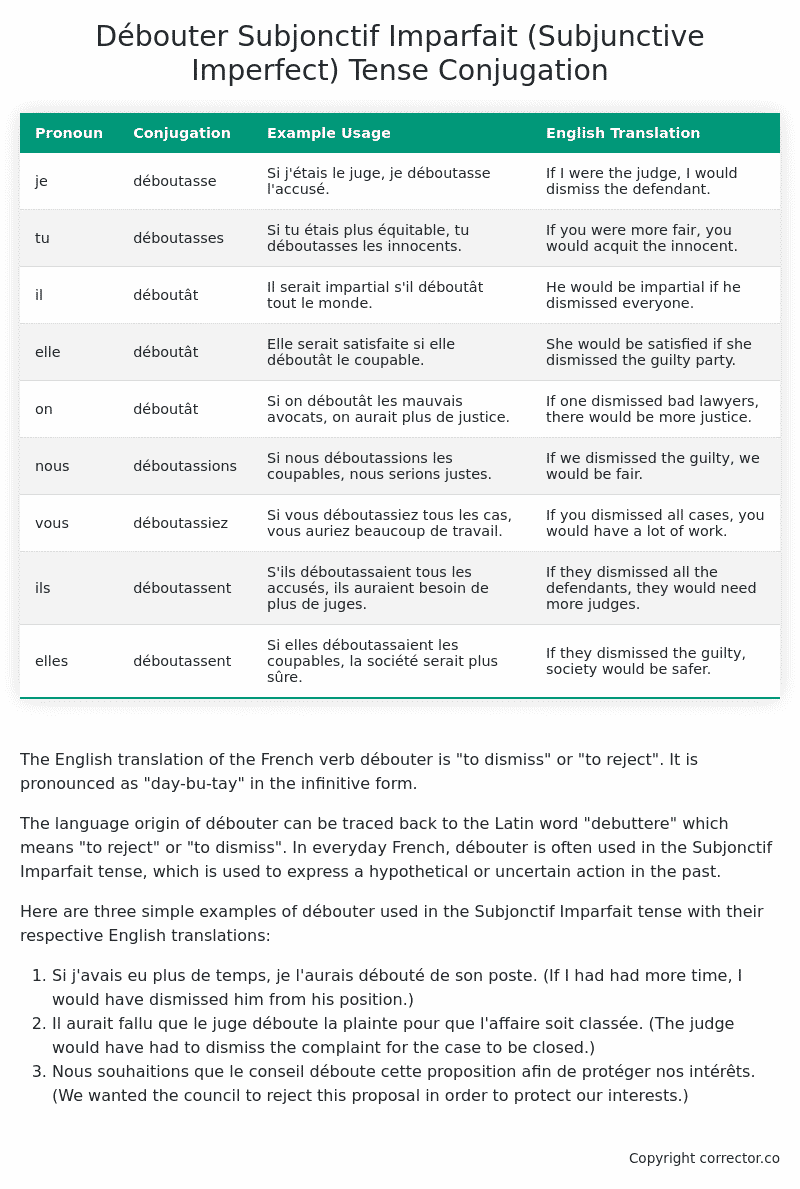Subjonctif Imparfait (Subjunctive Imperfect) Tense Conjugation of the French Verb débouter
Introduction to the verb débouter
The English translation of the French verb débouter is “to dismiss” or “to reject”. It is pronounced as “day-bu-tay” in the infinitive form.
The language origin of débouter can be traced back to the Latin word “debuttere” which means “to reject” or “to dismiss”. In everyday French, débouter is often used in the Subjonctif Imparfait tense, which is used to express a hypothetical or uncertain action in the past.
Here are three simple examples of débouter used in the Subjonctif Imparfait tense with their respective English translations:
- Si j’avais eu plus de temps, je l’aurais débouté de son poste. (If I had had more time, I would have dismissed him from his position.)
- Il aurait fallu que le juge déboute la plainte pour que l’affaire soit classée. (The judge would have had to dismiss the complaint for the case to be closed.)
- Nous souhaitions que le conseil déboute cette proposition afin de protéger nos intérêts. (We wanted the council to reject this proposal in order to protect our interests.)
Table of the Subjonctif Imparfait (Subjunctive Imperfect) Tense Conjugation of débouter
| Pronoun | Conjugation | Example Usage | English Translation |
|---|---|---|---|
| je | déboutasse | Si j’étais le juge, je déboutasse l’accusé. | If I were the judge, I would dismiss the defendant. |
| tu | déboutasses | Si tu étais plus équitable, tu déboutasses les innocents. | If you were more fair, you would acquit the innocent. |
| il | déboutât | Il serait impartial s’il déboutât tout le monde. | He would be impartial if he dismissed everyone. |
| elle | déboutât | Elle serait satisfaite si elle déboutât le coupable. | She would be satisfied if she dismissed the guilty party. |
| on | déboutât | Si on déboutât les mauvais avocats, on aurait plus de justice. | If one dismissed bad lawyers, there would be more justice. |
| nous | déboutassions | Si nous déboutassions les coupables, nous serions justes. | If we dismissed the guilty, we would be fair. |
| vous | déboutassiez | Si vous déboutassiez tous les cas, vous auriez beaucoup de travail. | If you dismissed all cases, you would have a lot of work. |
| ils | déboutassent | S’ils déboutassaient tous les accusés, ils auraient besoin de plus de juges. | If they dismissed all the defendants, they would need more judges. |
| elles | déboutassent | Si elles déboutassaient les coupables, la société serait plus sûre. | If they dismissed the guilty, society would be safer. |
Other Conjugations for Débouter.
Le Present (Present Tense) Conjugation of the French Verb débouter
Imparfait (Imperfect) Tense Conjugation of the French Verb débouter
Passé Simple (Simple Past) Tense Conjugation of the French Verb débouter
Passé Composé (Present Perfect) Tense Conjugation of the French Verb débouter
Futur Simple (Simple Future) Tense Conjugation of the French Verb débouter
Futur Proche (Near Future) Tense Conjugation of the French Verb débouter
Plus-que-parfait (Pluperfect) Tense Conjugation of the French Verb débouter
Passé Antérieur (Past Anterior) Tense Conjugation of the French Verb débouter
Futur Antérieur (Future Anterior) Tense Conjugation of the French Verb débouter
Subjonctif Présent (Subjunctive Present) Tense Conjugation of the French Verb débouter
Subjonctif Passé (Subjunctive Past) Tense Conjugation of the French Verb débouter
Subjonctif Imparfait (Subjunctive Imperfect) Tense Conjugation of the French Verb débouter (this article)
Subjonctif Plus-que-parfait (Subjunctive Pluperfect) Tense Conjugation of the French Verb débouter
Conditionnel Présent (Conditional Present) Tense Conjugation of the French Verb débouter
Conditionnel Passé (Conditional Past) Tense Conjugation of the French Verb débouter
L’impératif Présent (Imperative Present) Tense Conjugation of the French Verb débouter
L’infinitif Présent (Infinitive Present) Tense Conjugation of the French Verb débouter
Struggling with French verbs or the language in general? Why not use our free French Grammar Checker – no registration required!
Get a FREE Download Study Sheet of this Conjugation 🔥
Simply right click the image below, click “save image” and get your free reference for the débouter Subjonctif Imparfait tense conjugation!

Débouter – About the French Subjonctif Imparfait (Subjunctive Imperfect) Tense
Formation
Common Everyday Usage Patterns
Interactions with Other Tenses
Subjonctif Présent
Indicatif Passé Composé
Conditional
Conditional Perfect
Summary
I hope you enjoyed this article on the verb débouter. Still in a learning mood? Check out another TOTALLY random French verb conjugation!


